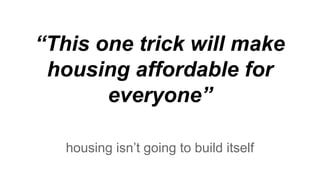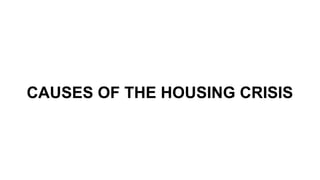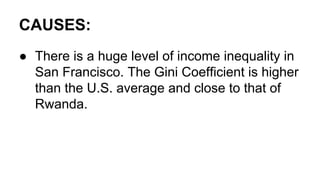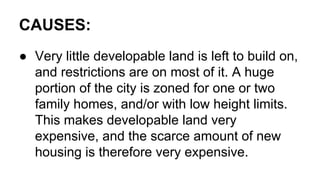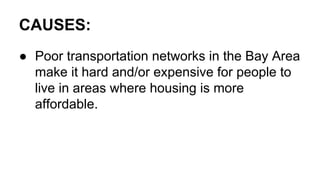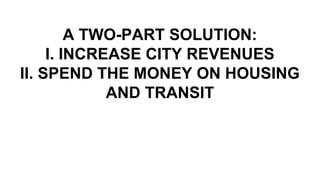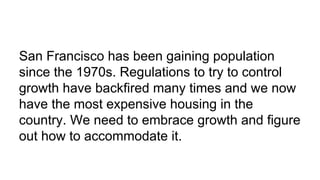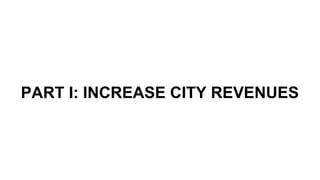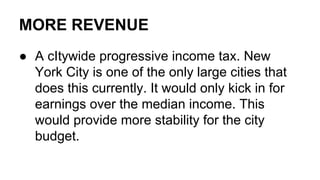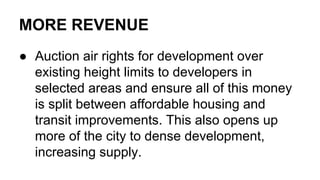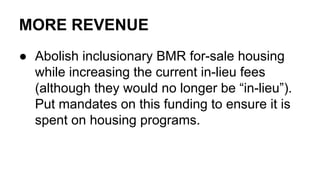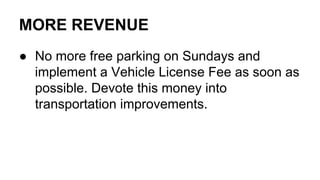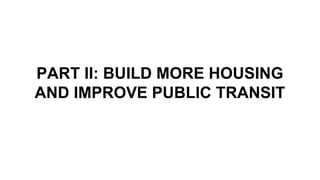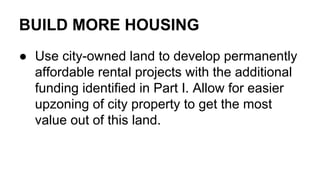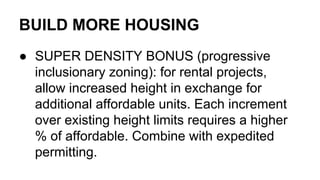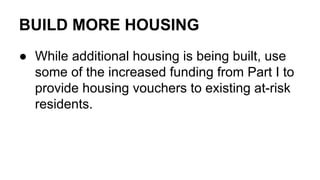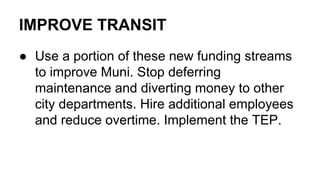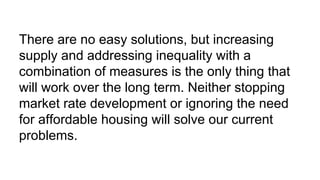Architect Mark Hogan: Hack the Housing Crisis slides
- 1. “This one trick will make housing affordable for everyone” housing isn’t going to build itself
- 2. CAUSES OF THE HOUSING CRISIS
- 3. CAUSES: â—Ź There is a huge level of income inequality in San Francisco. The Gini Coefficient is higher than the U.S. average and close to that of Rwanda.
- 4. CAUSES: â—Ź Very little developable land is left to build on, and restrictions are on most of it. A huge portion of the city is zoned for one or two family homes, and/or with low height limits. This makes developable land very expensive, and the scarce amount of new housing is therefore very expensive.
- 5. CAUSES: â—Ź Poor transportation networks in the Bay Area make it hard and/or expensive for people to live in areas where housing is more affordable.
- 6. A TWO-PART SOLUTION: I. INCREASE CITY REVENUES II. SPEND THE MONEY ON HOUSING AND TRANSIT
- 7. San Francisco has been gaining population since the 1970s. Regulations to try to control growth have backfired many times and we now have the most expensive housing in the country. We need to embrace growth and figure out how to accommodate it.
- 8. PART I: INCREASE CITY REVENUES
- 9. MORE REVENUE â—Ź A cItywide progressive income tax. New York City is one of the only large cities that does this currently. It would only kick in for earnings over the median income. This would provide more stability for the city budget.
- 10. MORE REVENUE â—Ź Auction air rights for development over existing height limits to developers in selected areas and ensure all of this money is split between affordable housing and transit improvements. This also opens up more of the city to dense development, increasing supply.
- 11. MORE REVENUE ● Abolish inclusionary BMR for-sale housing while increasing the current in-lieu fees (although they would no longer be “in-lieu”). Put mandates on this funding to ensure it is spent on housing programs.
- 12. MORE REVENUE â—Ź No more free parking on Sundays and implement a Vehicle License Fee as soon as possible. Devote this money into transportation improvements.
- 13. PART II: BUILD MORE HOUSING AND IMPROVE PUBLIC TRANSIT
- 14. BUILD MORE HOUSING â—Ź Use city-owned land to develop permanently affordable rental projects with the additional funding identified in Part I. Allow for easier upzoning of city property to get the most value out of this land.
- 15. BUILD MORE HOUSING â—Ź SUPER DENSITY BONUS (progressive inclusionary zoning): for rental projects, allow increased height in exchange for additional affordable units. Each increment over existing height limits requires a higher % of affordable. Combine with expedited permitting.
- 16. BUILD MORE HOUSING â—Ź While additional housing is being built, use some of the increased funding from Part I to provide housing vouchers to existing at-risk residents.
- 17. IMPROVE TRANSIT â—Ź Use a portion of these new funding streams to improve Muni. Stop deferring maintenance and diverting money to other city departments. Hire additional employees and reduce overtime. Implement the TEP.
- 18. There are no easy solutions, but increasing supply and addressing inequality with a combination of measures is the only thing that will work over the long term. Neither stopping market rate development or ignoring the need for affordable housing will solve our current problems.

